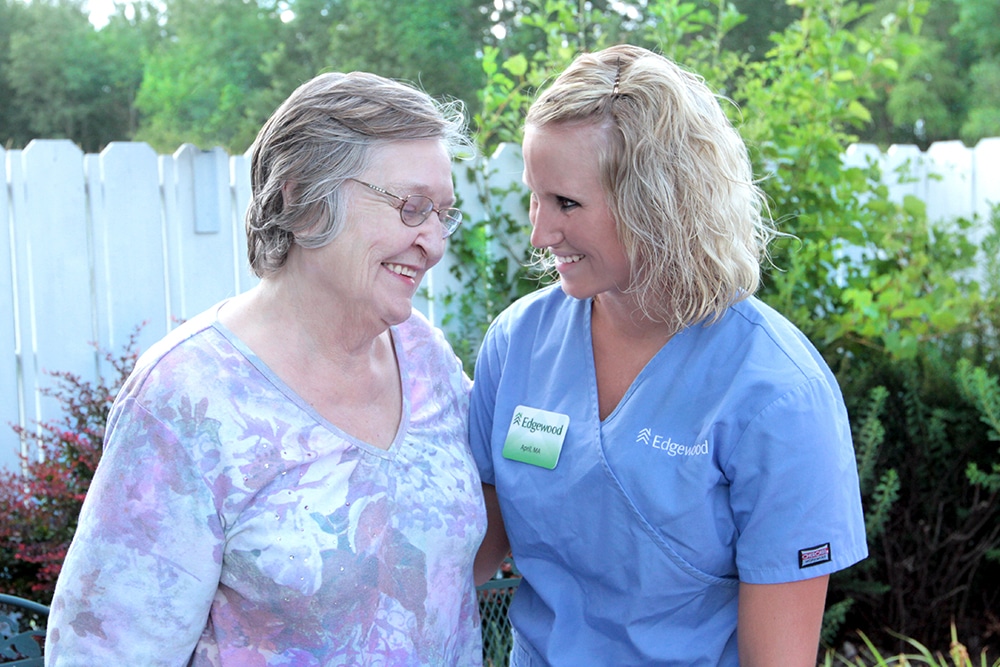Finding out you or your loved one has Alzheimer’s disease can be difficult, confusing and scary. Fortunately, the future is looking brighter as researchers and organizations like the Alzheimer’s Association work towards finding a cure. Learn more about the disease, what preventative measures you can take, and current therapies being studied.


First discovered by Dr. Alois Alzheimer in 1906, Alzheimer’s disease is a type of dementia that causes issues with memory, thinking, and behavior. Symptoms develop and worsen over time, eventually becoming severe enough to interfere with daily tasks. There’s not one single cause of Alzheimer’s, but risk factors include:
Age – people tend to develop Alzheimer’s at age 65 and older.
Family History – if you have an immediate family member with the disease, you’re more likely to develop it yourself.
Genetics – Certain genes, like apolipoprotein E, are linked to Alzheimer’s disease.

While there is currently no known cure for Alzheimer’s disease, there are medications or other treatments doctors can recommend to help ease the symptoms and delay the progression of the disease.
At present, there are five Alzheimer’s drugs approved by the U.S. Food and Drug Administration (FDA) to treat the symptoms of the disease, but they do not treat its cause or progression. There are no known methods of preventing the disease.
Find Senior Living Near Me
However, researchers have focused on overall healthy lifestyle choices as a way to prevent decline, including:
- Quit smoking
- Regular exercise
- Cognitive training exercises
- Plant-based diet
- Consume antioxidants
- Interact socially

We use Life Stations at Edgewood to help our residents spark old memories and create activities that encourage interest, movement, and interaction. Made of old gardening supplies, baby dolls, and other items, these stations help residents revisit and retain memories while also inspiring new moments of joy.

The next generation of drug therapies is under research, and they give some hope for the future of preventing and curing Alzheimer’s disease. The following are examples of medications being analyzed:
Beta-Amyloid
- Known to be a key indicator of Alzheimer’s, excessive amounts of this protein cause plaques in the brain, indicating the disease. Researchers are developing medications aimed at blocking and clearing out beta-amyloid.
Beta-Secretase (BACE)
- BACE makes it possible for beta-amyloid to form. Medicines that interrupt this process could reduce the amount of beta-amyloid in the brain and stop the development of Alzheimer’s.
Tau Protein
- Tau protein is the main component of neurofibrillary tangles, another key factor of Alzheimer’s. Researchers are looking for ways to prevent tau protein from turning into tangles.

Scientists are constantly searching for new treatments to help slow, stop, or even prevent Alzheimer’s disease. A critical part of this process is clinical trials, where researchers test medications.
Dominantly Inherited Alzheimer Network Trials Unit (DIAN-TU)
A rare form of Alzheimer’s disease can develop if a person has a specific type of gene mutation. DIAN-TU hopes to slow or stop disease development in these individuals with experimental drugs. This study is currently testing gantenerumab and solanezumab, which remove excess beta-amyloid in the brain.
The Alzheimer’s Prevention Initiative (API)
API includes the Autosomal Dominant Alzheimer’s Disease (ADAD) trial and the Generation Study. Like DIAN-TU, the API tests people with a gene mutation but have not yet developed symptoms.
The ADAD trial studies Crenezumab – an immune-based therapy that delivers antibodies to reduce the negative effects of excess beta-amyloid.
The Generation Study is based on healthy older adults who are at high risk for developing Alzheimer’s based on their age and possession of two copies of the APOE-e4 gene. It focuses on an active immunotherapy drug (CAD106) and BACE inhibitor (CNP5520).


Here at Edgewood, we’re passionate about caring for those with Alzheimer’s, helping their families who are walking through the difficult times, and finding a cure. We do this through ongoing fundraising efforts to raise awareness for the disease and research. Also, we proudly sponsor a corporate Walk to End Alzheimer’s team, as well as local teams at several of our 60+ communities. Thirdly, each year we are honored to participate in the Alzheimer’s Association’s The Longest Day event which raises funds for awareness, support and research efforts.
Alzheimer’s and memory loss affect everyone differently. If you or a loved one have been diagnosed with Alzheimer’s or another type of dementia, support is available 24/7 through the Alzheimer’s Association at 800.272.3900. They also provide many helpful resources to help you and your family understand how to be a caregiver and live a fulfilling life with Alzheimer’s.
Looking for more comprehensive support? Find an Edgewood community today where our understanding staff can provide you or your loved one with personal attention, help improve self-esteem and reinforce positive experiences.




